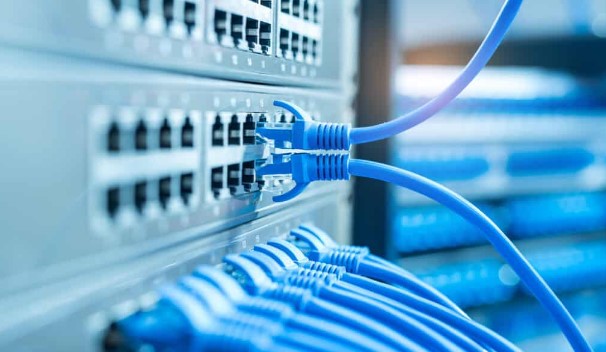Benefits of a Wired Network Installation

Wired networks have a lot of benefits for modern business. When your business relies on shared software, file sharing, online transactions, and other digital tools, it is imperative that the network that supports them has the best performance possible.
Wired networks offer that performance, with benefits like fast data speeds, incredibly stable connections, better security, and the option to easily expand network capabilities in the future. Although wireless networks are easy and convenient, they fall short against wired networks when it comes to speed, security, reliability, and overall bandwidth. A wired network is much more difficult to hack into, experiences much fewer service disruptions, and can handle files of greater size without lag.
Professional wired network installation offers even more benefits to companies, as it helps control cost, saves time, creates an optimized system right out of the gate, and gives you access to experts when you need help with your network.
Benefits of a Wired Network Installation
Faster data speeds
Wired Ethernet networks are far faster than their Wi-Fi counterparts–especially fiber optic networks, which are lightning-fast.
Data speed on wireless networks can be slow and unsteady because the radio waves that transmit the data have to contend with obstacles such as walls, furniture, and distance from the router. Its speed is limited by all the things the wi-fi signal has to get over, under, or around. This is why Wi-Fi networks, even strong ones, have conspicuous dead spots where the signal simply can’t reach.
But wired networks rely on physical cables, meaning that data has a defined path to follow between devices. The only obstacles to data speed on a wired network is the data-carrying capacity of the cable type chosen, and the software configuration of the network.
Larger bandwidth
Wi-Fi struggles when it comes to transmitting large files because the radio waves it sends information on can only support so much data at a time. But in wired networks, this digital data travels through carefully arranged physical cables whose carrying capacity is much greater. It’s the difference between moving house with a hatchback, and moving house with a pickup truck.
Stable connection
Similarly, the physical nature of a wired system means it isn’t affected by many of the things that can down Wi-Fi, such as excess wind or snow, device overload, insufficient power and range, or radio interference.
Wired systems will continue to function at a high level during everything but a power outage–and even then, if you have a backup generator, they’ll still be able to keep your business connected, your servers operational, and your data saved and secure.
Better security
Wired networks are the most secure kind of network because anyone who wants to use the network needs to have actual, physical access to a port or connected device. This means you can limit physical access to a network with password-protected devices and locked-door server rooms.
A wired network is also more difficult to hack thanks to the use of firewall devices, not just firewall software. These devices use special protocols to police all incoming and outgoing network traffic, communications, and transactions, to make sure that malware, viruses, worms, hackers, and other security threats remain outside.
This is in contrast to a Wi-Fi system, which runs on radio waves that an intruder can piggy-back onto from a close enough range (like the company parking lot), and which has less robust firewall hardware.
Future-proof
Wired networks can help your business exceed its goals now and in the future. Once a wired system is in place, it’s relatively easy to modify–with cable and hardware upgrades, incorporating additional devices, adding more equipment to the system, and even plugging a Wi-Fi booster into the wired network to support an Internet of Things.
Benefits of Using a Professional Network Installer
Even beyond the straightforward benefits of a wired network, there are also significant advantages to having a professional install your network that make it worth a look.
Control costs
Network installers know how to work to budget without cutting corners, thanks to their experience and resources.
This is especially true of companies that conduct on-site walkthroughs and assessments before even making an estimate. These IT professionals know obstacles and opportunities to identify in their assessment in order to maximize your return on investment.
Save time
Professional network installers already have all the skills they need to assess a site, design a topology, situate hardware and data ports, lay cable, and execute a successful installation.
It may be possible to DIY some or all of these steps, but it will take longer, since you need to learn as you go, and it costs more if mistakes are made and steps need to be redone.
Optimize your system
If you’re going to the trouble of installing a network, you certainly want it to be the best network it can be. An IT professional will design and install a network that not only meets your needs but exceeds them for excellent performance as soon as it is installed and operational.
Plus, an optimized system is also a system that can be easily maintained, updated, and even expanded as time goes by.
Expert assistance
When you use professional network installation services, you have a huge advantage whenever technical issues arise. The experts that built your network are the experts that can investigate, troubleshoot, fix, and re-configure your network to get it back in action in as little time as possible.
This factor is a huge bonus to companies who rely on the power and reliability of their network to conduct essential business tasks like file sharing, VOIP, conferencing, and more.
Contact us Today!
ADDRESS
- Western Heights, 5th Floor, Karuna Close.
PAGES
- About US
- Our Services
- Blog
- Contact Us
